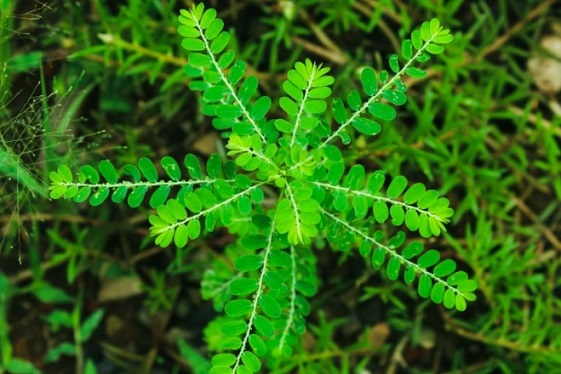Corilagin from the Plant Phyllanthus Urinaria Shows Potential in Fighting Ovarian Cancer
Nikhil Prasad Fact checked by:Thailand Medical News Team Feb 11, 2025 2 months, 1 day, 22 hours, 58 minutes ago
Medical News: A new study has highlighted the potential of corilagin, a natural phytochemical compound, in inhibiting ovarian cancer cell growth. Researchers from Wuhan Polytechnic University and Huazhong University of Science and Technology in China investigated the effects of corilagin on A2780 ovarian cancer cells and its mechanisms of action. The findings suggest that corilagin could serve as a promising therapeutic agent for ovarian cancer, offering hope for new treatment approaches.
 Corilagin from the Plant Phyllanthus Urinaria Shows Potential in Fighting Ovarian Cancer
Corilagin from the Plant Phyllanthus Urinaria Shows Potential in Fighting Ovarian Cancer
Ovarian cancer is one of the deadliest gynecological malignancies, and current treatments often have limited effectiveness and severe side effects. Researchers have long been exploring natural compounds as alternative treatment options. Corilagin, a polyphenol found in plants like Phyllanthus urinaria and white clover, has shown anti-tumor properties in previous studies. This
Medical News report delves into the latest findings on how corilagin impacts ovarian cancer cells and its potential mechanisms.
Corilagin Inhibits Cancer Cell Growth While Sparing Healthy Cells
In laboratory experiments, scientists treated A2780 ovarian cancer cells with different concentrations of corilagin. The results showed that corilagin effectively inhibited the proliferation of these cancer cells in a dose-dependent manner. At higher concentrations (80-100 µmol/mL), corilagin's effectiveness was comparable to 5-fluorouracil (5-FU), a commonly used chemotherapy drug. Notably, corilagin had significantly lower toxicity toward normal ovarian epithelial cells (IOSE-80), suggesting it may be a safer treatment option compared to conventional chemotherapy.
The study also found that corilagin caused a shift in the cell cycle of A2780 cells. The proportion of cells in the G0/G1 and G2/M phases decreased, while more cells were arrested in the S phase. This indicates that corilagin disrupts normal cell cycle progression, preventing cancer cells from dividing and growing uncontrollably.
Corilagin Induces Apoptosis in Ovarian Cancer Cells
Further analysis revealed that corilagin plays a role in triggering apoptosis, or programmed cell death, in ovarian cancer cells. Scientists observed a significant increase in apoptosis markers in corilagin-treated cells. At lower doses (20 µmol/mL), corilagin induced apoptosis in about 13% of the cells, while at the highest concentration tested (100 µmol/mL), the apoptosis rate exceeded 50%.
One of the key findings was the impact of corilagin on mitochondrial function. Researchers found that corilagin reduced mitochondrial membrane potential and increased intracellular calcium levels, both of which are crucial indicators of apoptosis. These changes suggest that corilagin disrupts cancer cell metabolism, leading to cell death.
Gene Expression Analysis Links Corilagin to PI3K-AKT Pathway
To understand the molecular mechanisms behind corilagin&rsq
uo;s effects, researchers conducted transcriptome sequencing of A2780 cells. The analysis revealed 792 differentially expressed genes (DEGs), with many linked to apoptosis and cell cycle regulation. Further gene ontology (GO) and KEGG pathway analysis indicated that corilagin affects the PI3K-AKT signaling pathway, which is crucial for cell survival and proliferation.
Gene expression analysis confirmed that corilagin treatment led to an increase in pro-apoptotic genes such as p53, PUMA, BAX, CASPASE9, CASPASE3, and cytochrome C. At the same time, the expression of the anti-apoptotic gene BCL-2 was significantly reduced. These findings suggest that corilagin triggers apoptosis by modulating the PI3K/p53 signaling pathway, a key regulator of cancer cell death.
Corilagin Could Enhance Existing Cancer Treatments
While corilagin shows promise as a standalone treatment, its relatively mild cytotoxic effects suggest that it may be even more effective when combined with other therapies. Researchers propose that combining corilagin with existing chemotherapy drugs targeting the PI3K/p53 pathway could enhance anti-cancer effects while reducing toxicity.
Another challenge is corilagin's low bioavailability, which means the body may not absorb it efficiently. Future research should explore innovative drug delivery systems to improve its effectiveness as a treatment option.
Conclusion
The study provides compelling evidence that corilagin has significant anti-tumor properties against ovarian cancer A2780 cells. It works by arresting the cell cycle, inducing apoptosis, and altering mitochondrial function. The findings suggest that corilagin's effects are largely mediated through the PI3K/p53 pathway, making it a promising candidate for further research and development. Future studies should focus on improving corilagin’s bioavailability and exploring its potential in combination therapies. As a natural compound with low toxicity to normal cells, corilagin offers a hopeful prospect for safer ovarian cancer treatments.
The study findings were published in the peer-reviewed journal: Current Issues in Molecular Biology.
https://www.mdpi.com/1467-3045/47/2/105
For the latest on Herbs and Phytochemicals, keep on logging to Thailand
Medical News.
Read Also:
https://www.thailandmedical.news/news/ovarian-cancer-news-study-warns-of-common-jobs-by-females-that-increases-their-risk-of-developing-ovarian-cancer
https://www.thailandmedical.news/news/ovarian-cancer-new-rapid-diagnostic-tests-to-detect-ovarian-cancer-more-accurately-developed-by-scientist-from-finland
https://www.thailandmedical.news/news/new-treatment-protocol-for-ovarian-cancer-that-is-resistant-to-chemotherapy-
https://www.thailandmedical.news/articles/cancer
